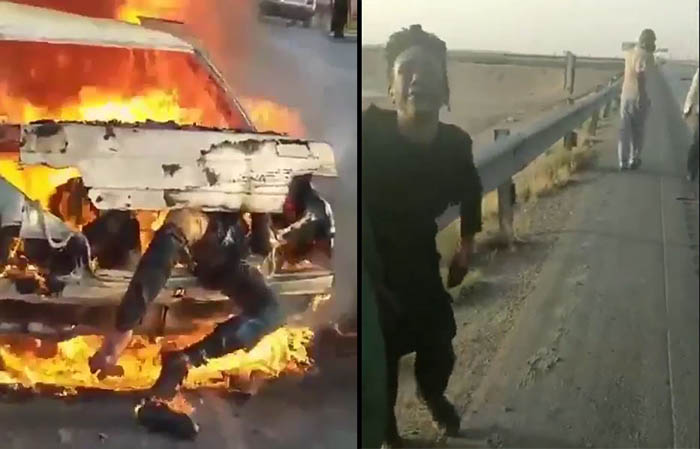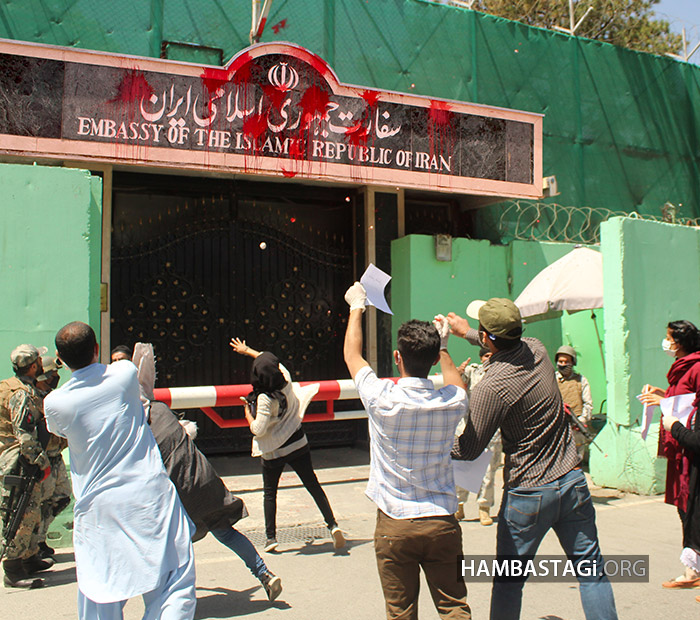By Stefanie Glinski
Tens of thousands of Afghans have protested on social media against the mistreatment of the refugees. Dozens more have protested on the streets in Kabul and in eastern Nangarhar province, with more demonstrations planned for major cities like London, Washington DC and Toronto in mid-June.

Iran police in Yazd, set on fire a car carrying 13 Afghan refugees, some die and others seriously wounded.
A further four people were injured in the incident, and a video later emerged showing one of the passengers in the car pleading for water, saying “I am burning.”
One of the survivors was later photographed in an Iranian hospital, handcuffed to his bed.
The incident comes weeks after an investigation was launched into the alleged killings of dozens of Afghan refugees who crossed the border illegally and were forced at gunpoint into a river. Photos of drowned bodies later circulated online.
Using the hashtags #StopKillingAfghans and #Iamburning, Afghans living in the country and the diaspora have been appealing on social media with the message: “Afghan lives matter.”
An online petition, aimed at the UN and the Afghan and Iranian governments, has gathered more than 40,000 signatures over the past three days.
The mistreatment of Afghan nationals in Iran has long been documented by human rights groups. “The horrific and repeated attacks on Afghan migrants in Iran cannot go ignored,” Omar Waraich, Amnesty International’s head of South Asia, told the Guardian.
He added: “They raise questions about how the Iranian authorities have treated Afghans over recent years, including forcibly deporting them to a war zone in vast numbers. The promises of an investigation are not enough. There needs to be an independent and effective probe that holds the Iranian officials responsible to account and delivers justice to Afghan victims, who have been treated with contempt.”
Almost 3 million Afghans live in Iran, many of them escaping war or economic hardship. Tens of thousands have returned home in the wake of the coronavirus pandemic that has hit Iran hard. As protests gain momentum in Afghanistan – inspired by the Black Lives Matter movement and the global outcry over the killing of George Floyd and other black US citizens – prominent Afghans have spoken out.
“What happened to your culture, neighbour? We burned in the fire of your deceit,” Afghan singer Ghezaal Enayat wrote in a new song.
“I add my voice to the chorus of Afghans who have denounced the recent killing of Afghan refugees at the hands of Iranian police in central Yazd province,” Khaled Hosseini, author of global bestseller The Kite Runner, wrote on social media, adding that “it is shocking and unforgivable […] Iranian police violence against Afghan migrants and refugees must end.”
Afghanistan’s former president Hamid Karzai wrote that he was deeply saddened by the car blaze, saying that he hoped “all will be done to prevent the recurrence of such incidents”.
Afghanistan has seen more than 40 years of war, with more than 10,000 civilians killed or injured last year alone according to the UN. Many have had no choice but to flee their homes in conflict-ridden areas.
Shaharzad Akbar, chairperson of Afghanistan’s Independent Human Rights Commission, said in response to the car fire that “refugee rights are human rights”.

On Jun 8, 2020, Afghan citizens held a protest outside the Iranian regime’s embassy in Kabul against the regime’s crimes against Afghan migrants, particularly two recent mass killings of Afghan migrants in Iran. The demonstration was organized by the Afghanistan Solidarity Party. Participants condemned the attack by the regime’s forces on a vehicle of Afghan migrants, which resulted in some Afghan citizens being burnt alive.



